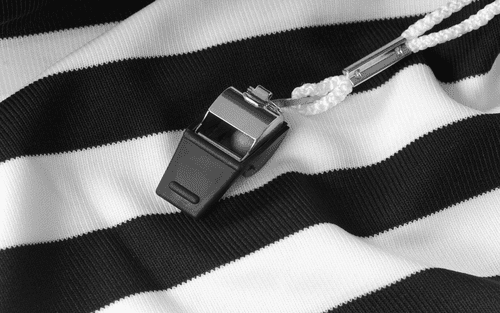Hello all, my name is Ethan Johnson, and I am the newest law clerk at SW&L. Currently, I am in my last semester of law school at the University of North Dakota and will be sitting for the bar exam at the end of July. During my time in law school, I have spent considerable time on the hardwood furthering an officiating career refereeing basketball at the collegiate and high school levels. As I get closer to becoming a licensed attorney, I have noticed areas where the two professions build on one another and hold similarities.
In every little league game and Friday night lights football game all the way to the NCAA Final Four to Super Bowls, you will find striped participants. These individuals, of course, are the referees. Their job is to enforce the rules of the game and make sure the playing field is fair. The rule books come in black and white, much like the black letter law, statutes, and case opinions. However, the enforcement of such rules and the law is anything but black and white.
Ed Hochuli is a former NFL referee and lawyer. He was famous for giving articulate explanations of penalties to stadiums filled with tens of thousands of people. His eloquent explanations may not have persuaded fans that their favorite team did hold the defense, but it did show how knowledgeable referees need to be in their profession. Referees, like lawyers, need to be able to recall rules or the laws of the game on demand. Further, referees and lawyers need to apply their knowledge to unique situations.
In the same way that no case before a lawyer is exactly the same, no athletic contest before a referee is the same. Here is where both referees and lawyers earn their pay. Anyone in the state of North Dakota is subject to the laws of North Dakota, just like every basketball team in the NCAA is subject to enforcement of the NCAA rule book. However, any sports fan knows that every rule infraction in an athletic contest is not enforced, just like not every violation of the law is enforced in North Dakota. Each profession requires the lawyer, judge, or referee to navigate gray areas. For example, the reasonable person standard used in a negligence case is not straightforward. It is often a gray area for the lawyer to demonstrate that their client is not liable for damages because he/she acted as a reasonable person should. In a basketball game, it is illegal for a player to kick the ball intentionally. Nonetheless, whether or not the player was striking the ball with his foot on purpose is a situational judgment call. Lawyers, like referees, “earn their stripes” on their ability to navigate the areas where there is no clear right or wrong answer.
One of the more challenging roles of a sports official is communicating with players and coaches in high-stress competitive environments. Officials need to explain their decisions, give rule-based reasoning, analyze situations objectively, and sympathize with the players’ and the coaches’ points of view. Lawyers need to do much of the same. Lawyers must give the court legal reasoning and explain why their argument is the correct one under the law. Further, lawyers are doing their clients a disservice if they do not objectively look at their situation to provide the most adequate advice. Lastly, as with almost any conflict situation, a lawyer needs to sympathize with clients and the opposing side to gain perspective on where that individual is coming from to gauge the best subjective outcome for their client. A career in officiating sports can aid the journey to a soon-to-be lawyer by giving individuals the tools to navigate the gray areas, use objective reasoning to further decisions, and sympathize with contrary points of view.
If you need legal assistance, contact SW&L at 701-297-2890 or email us at: info@swlattorneys.com.
The information contained in this article and on this website is for informational purposes only. Do not rely on the information on this website as legal advice.


